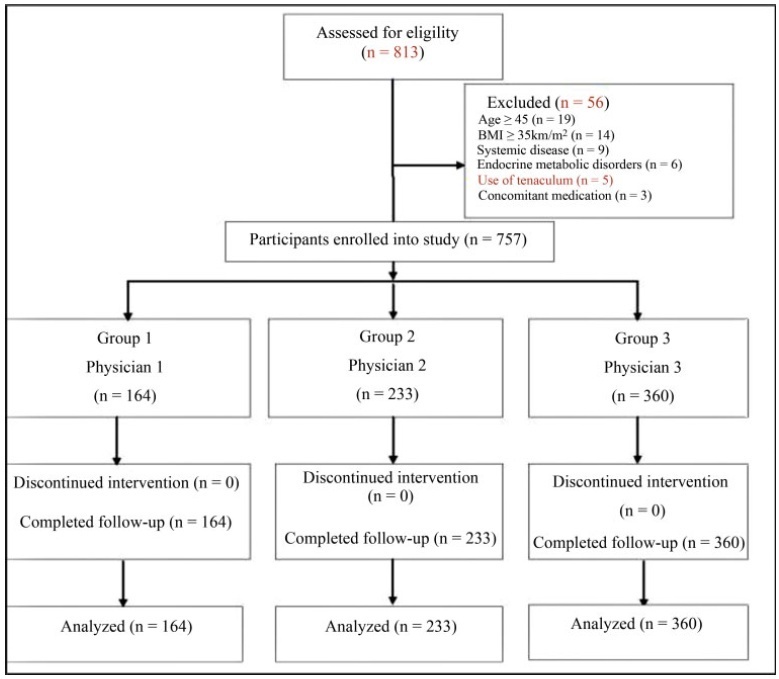Summary
Revista Brasileira de Ginecologia e Obstetrícia. 2022;44(1):19-24
02-28-2022
To evaluate whether there is an effect of the physician who transfers the embryos on pregnancy rates in in vitro fertilization-intracytoplasmic sperm injection (IVF-ICSI) treatment.
A total of 757 participants were analyzed between 2012 and 2017. Participants were classified according to 3 physicians who transferred the embryos: ([group 1=164 patients]; [group 2=233 patients]; [group 3=360 patients]). Baseline parameters and IVF-ICSI outcomes were compared between the groups.
No differences were determined between the groups regarding the baseline parameters (age, age subgroups [20-29, 30-39, and ≥ 40 years old)], body mass index (BMI), smoking status, infertility period, cause of infertility, baseline follicle stimulating hormone, luteinizing hormone, estradiol (E2), thyroid stimulating hormone, prolactin levels, antral follicle count, duration of stimulation, stimulation protocol, gonadotropin dose required, maximum E2 levels, progesterone levels, endometrial thickness on human chorionic gonadotropin (hCG) administration and transfer days (p>0.05). The numbers of oocytes retrieved,metaphase II (MII), 2 pronucleus (2PN), transferred embryo, fertilization rate, day ofembryo transfer, the catheter effect and embryo transfer technique, and clinical pregnancy rates (CPRs) were also comparable between the groups (p>0.05).
Our data suggests that the physician who transfers the embryos has no impact on CPRs in patients who have undergone IVF-ICSI, but further studies with more participants are required to elucidate this situation.

Summary
Revista Brasileira de Ginecologia e Obstetrícia. 2020;42(3):165-168
04-22-2020
Bilateral tubal ectopic pregnancy is a very rare form of ectopic pregnancy. The incidence is higher in women undergoing assisted reproductive techniques or ovulation induction. We report the case of bilateral tubal ectopic pregnancy. The patient was 30 years old and had a 3-year history of infertility; she was referred to the in-vitro fertilization (IVF) program because of tubal factor infertility. A pregnancy resulted from the transfer of two embryos during an artificial cycle. Despite the increase in β-hCG values during the follow-up, 22 days after the embryo transfer, the β-hCG levels were 2,408 U/L and the serum progesterone (P4) level was 10.53 ng/ml. After application with methotrexate, β-hCG levels did not decrease effectively. Moreover, the sonographic screening revealed a suspicious bilateral tubal focus for ectopic pregnancy. A mini-laparotomy was performed and a bilateral tubal pregnancy was found. In the case of unilateral tubal pregnancy after the transfer of two embryos, the situation of the other tube should be systematically checked and β-hCG levels should be monitored.